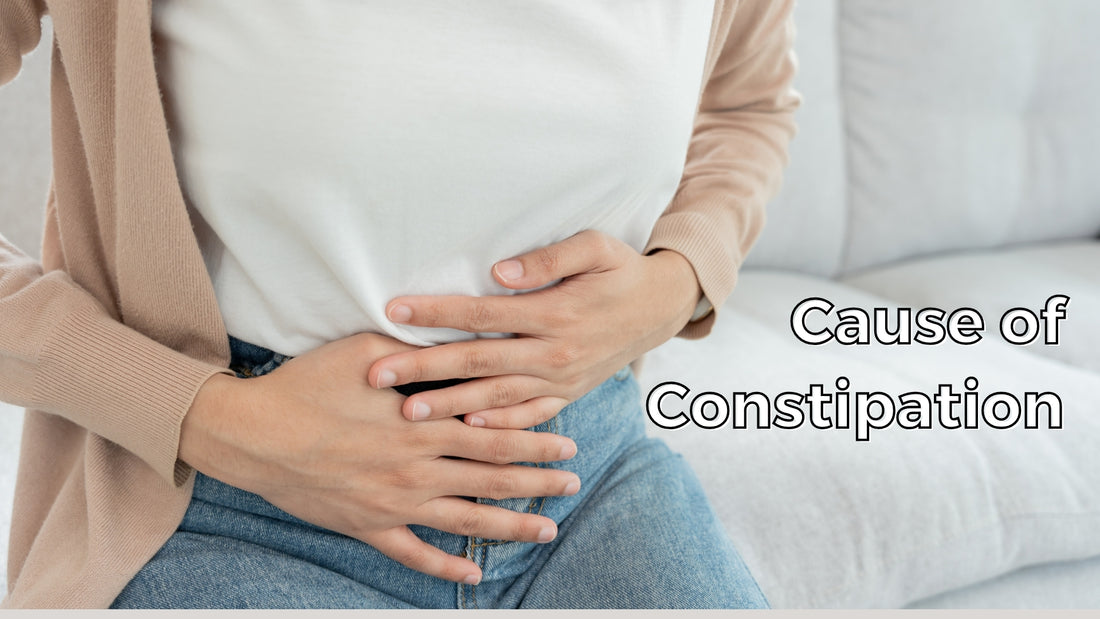
Cause of Constipation
Share
What is Constipation?
Constipation is defined as having fewer than three bowel movements per week, with stools that are hard, dry, and difficult to pass. It can be accompanied by bloating, discomfort, and a feeling of incomplete evacuation.

Common Causes of Constipation
-
Low Fiber Diet:
- Explanation: A diet lacking in fiber is one of the most common causes of constipation. Fiber adds bulk to the stool and helps it pass through the digestive system more easily.
- Solution: Increase your intake of high-fiber foods such as fruits, vegetables, whole grains, and legumes.
-
Dehydration:
- Explanation: Not drinking enough water can lead to dehydration, which makes stools hard and difficult to pass.
- Solution: Aim to drink at least 8 glasses of water a day. Staying hydrated helps keep the digestive system functioning smoothly.
-
Lack of Physical Activity:
- Explanation: Regular physical activity helps stimulate intestinal function. A sedentary lifestyle can slow down the digestive process.
- Solution: Incorporate regular exercise into your routine, such as walking, jogging, or yoga, to help keep things moving.
-
Ignoring the Urge to Go:
- Explanation: Ignoring the urge to have a bowel movement can lead to constipation as the stool becomes harder and more difficult to pass the longer it stays in the colon.
- Solution: Pay attention to your body’s signals and try to go to the bathroom as soon as you feel the urge.
-
Medications:
- Explanation: Certain medications, such as pain relievers, antidepressants, and iron supplements, can cause constipation as a side effect.
- Solution: If you suspect your medication is causing constipation, talk to your doctor about possible alternatives or solutions.
-
Changes in Routine:
- Explanation: Traveling, changes in eating habits, or disruptions to your daily routine can affect your bowel movements.
- Solution: Try to maintain a regular schedule and stay consistent with your diet and exercise even when your routine changes.
-
Medical Conditions:
- Explanation: Certain medical conditions, such as irritable bowel syndrome (IBS), diabetes, hypothyroidism, and neurological disorders, can cause constipation.
- Solution: If you have an underlying medical condition, work with your healthcare provider to manage it and address constipation as part of your treatment plan.
-
Stress and Anxiety:
- Explanation: Stress and anxiety can affect your digestive system, leading to constipation.
- Solution: Practice stress-reducing techniques such as deep breathing, meditation, or exercise to help manage stress levels.
-
Aging:
- Explanation: As we age, our digestive system can slow down, leading to more frequent constipation.
- Solution: Older adults should focus on maintaining a high-fiber diet, staying hydrated, and remaining physically active.
-
Hormonal Changes:
- Explanation: Hormonal changes, particularly in women during pregnancy or menstrual cycles, can affect bowel movements.
- Solution: Pregnant women and those experiencing hormonal changes should consult with their healthcare provider for specific dietary and lifestyle recommendations.
Tips for Preventing and Relieving Constipation
-
Eat a High-Fiber Diet:
- Include plenty of fruits, vegetables, whole grains, and legumes in your diet.
-
Stay Hydrated:
- Drink plenty of water and limit caffeine and alcohol, which can dehydrate you.
-
Exercise Regularly:
- Aim for at least 30 minutes of moderate exercise most days of the week.
-
Establish a Routine:
- Try to go to the bathroom at the same time each day to train your body.
-
Don’t Ignore the Urge:
- Go to the bathroom as soon as you feel the need.
-
Consider Fiber Supplements:
- If you’re not getting enough fiber from your diet, talk to your doctor about fiber supplements.
-
Limit Processed Foods:
- Reduce your intake of processed and high-fat foods, which can contribute to constipation.
-
Practice Good Bathroom Habits:
- Don’t rush; give yourself enough time to have a complete bowel movement.
When to See a Doctor
If constipation persists for more than a few weeks, is severe, or is accompanied by symptoms such as severe abdominal pain, blood in the stool, or unexplained weight loss, it’s important to seek medical attention. These could be signs of a more serious underlying condition that requires professional evaluation and treatment.
Conclusion
Constipation is a common issue that can often be managed with lifestyle and dietary changes. By understanding the causes and taking proactive steps, you can keep your digestive system healthy and avoid the discomfort of constipation. Remember, a healthy gut is key to overall well-being!
Stay healthy and happy,